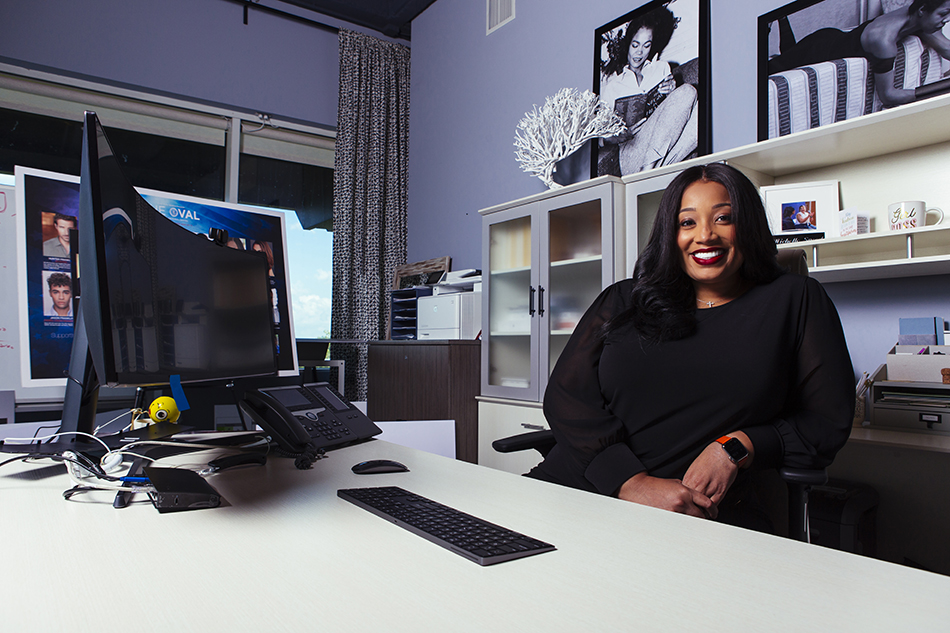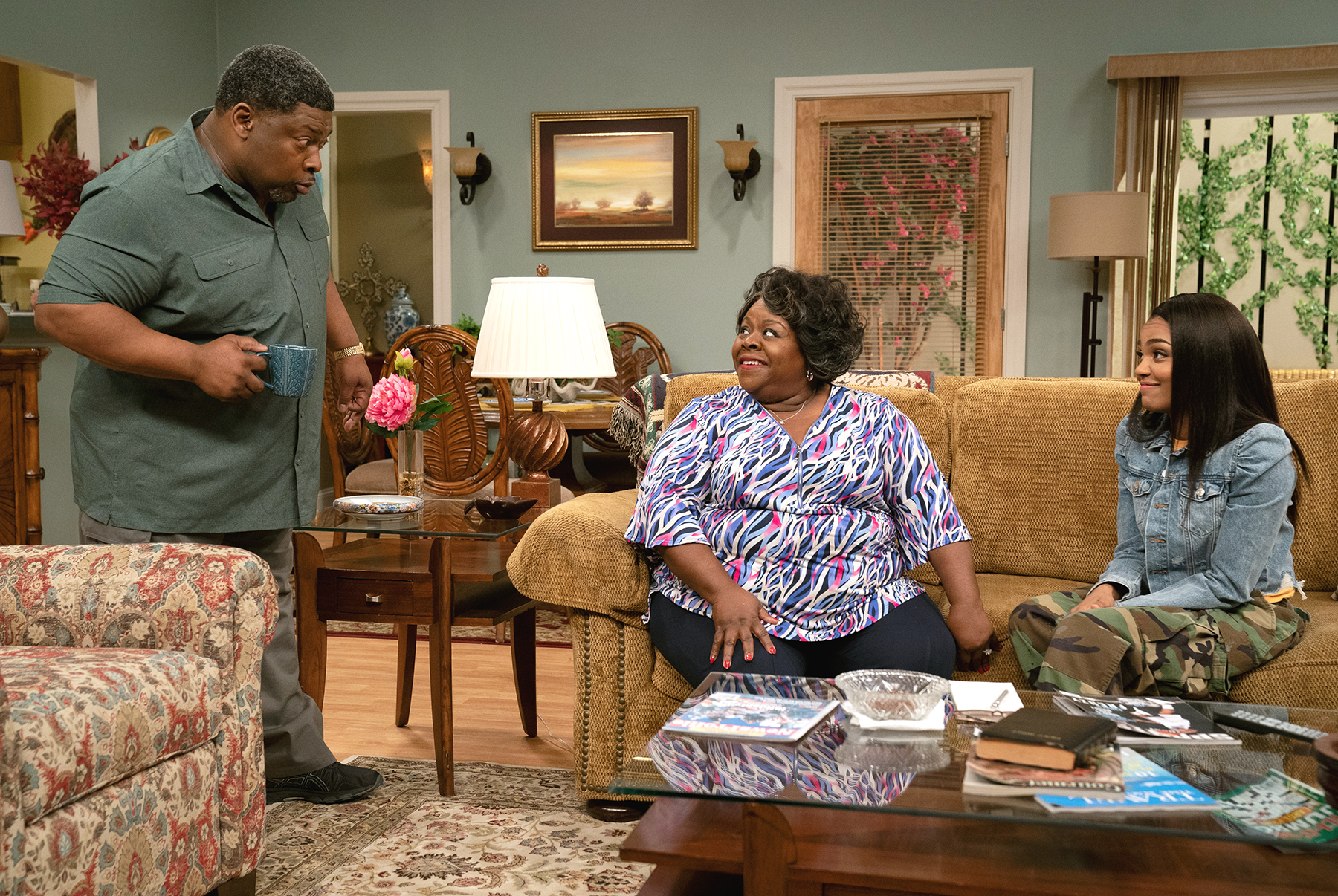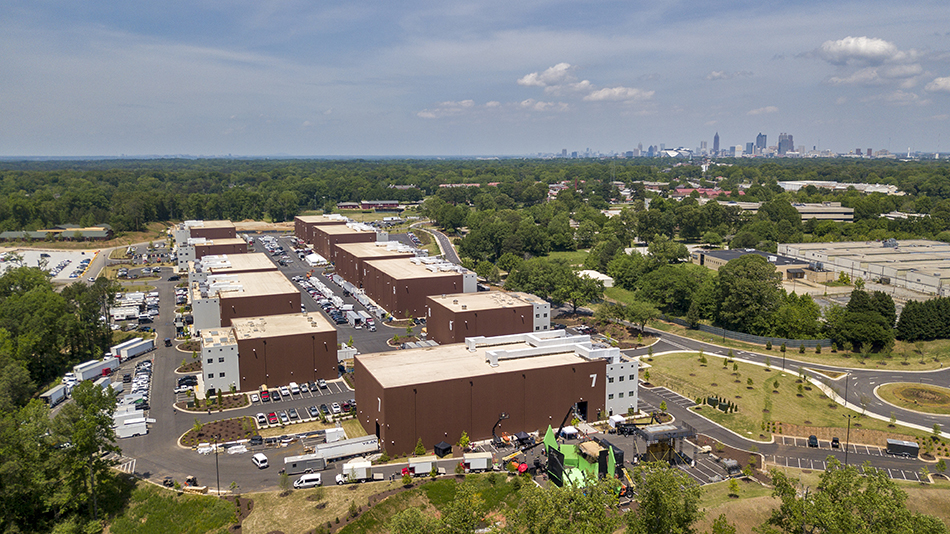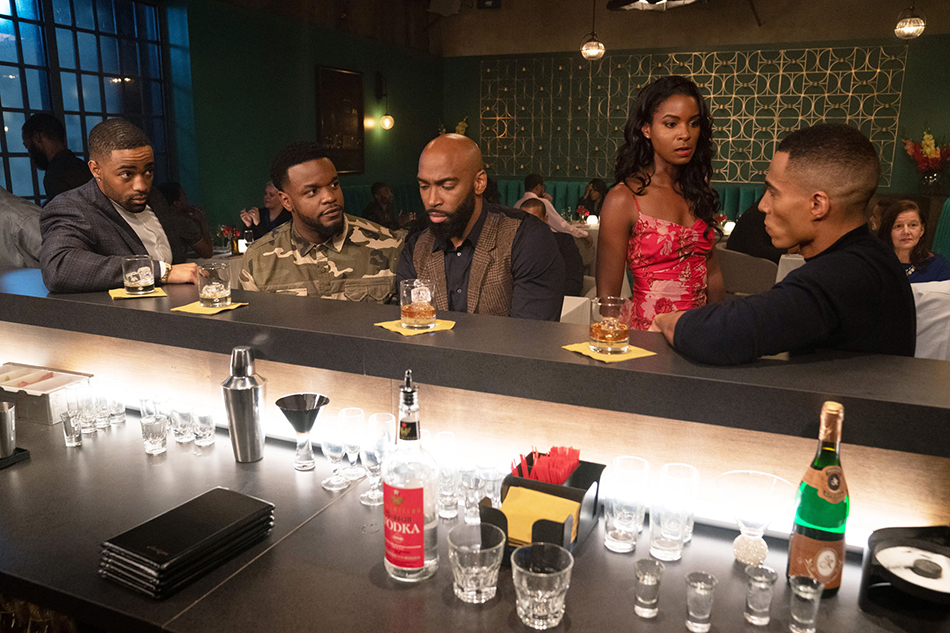Cover Story: Presiding Over the House of Perry
Michelle Sneed steers the prolific and successful Tyler Perry Studios operations, through good times and pandemic

The smarter way to stay on top of the multichannel video marketplace. Sign up below.
You are now subscribed
Your newsletter sign-up was successful
In his speech after receiving the TV Academy’s Governor’s Award during the 72nd Primetime Emmy Awards Sept. 20, producer/director Tyler Perry referenced his Atlanta megaproduction facility, a 330-acre former Confederate Army base purchased in 2015, which his grandmother and mother could not have imagined being owned by Perry — or any Black producer — in their lifetimes.
“In my grandmother’s quilt there were no patches for Black people on television,” said Perry, describing a quilt that represented memories from his family history. “Now, whether we know it or not, we are all sewing our own quilts with our thoughts and behaviors, our experiences and our memories.”
Orchestrating the new patches in the ever-expanding Tyler Perry Studios quilt is Michelle Sneed, president of production and development. As Perry’s right hand, Sneed — who initially joined TPS in 2009 and was named to her current position in 2018 after a brief stint with BET — oversees the production of the studios’ prolific lineup of original comedy and drama specials which over the years have bolstered the lineups of such networks as BET, TBS, OWN and streaming services like BET Plus. Sneed, 38, also serves as executive producer of several of the studios’ most popular shows, including The Oval, Sistas, Ruthless and Bruh, as well as Nickelodeon’s Young Dylan.
Since launching in 2006, Tyler Perry Studios has created more than a dozen scripted series and nearly 25 movies. Its first series, House of Payne, drew a then-cable sitcom record 5.9 million viewers in its June 2007 premiere on TBS and raised eyebrows when the network picked up a then-unprecedented 90-episode order for the series after an initial 10-episode run. Perry in 2019 would extend beyond linear television when he partnered with BET in 2019 to create original content for BET Plus.
Even the scourge of COVID-19 couldn’t hamper TPS’s momentum. Four months after suspending production in March, the studio was one of the first TV production companies to reopen, producing more than 80 episodes of four shows through September within a strict bubble atmosphere.
Sneed outlined the strategy behind the studio operation’s busy TV-production business, as well as the future of a still-hurting TV production industry post-pandemic, with Multichannel News. Here’s an edited transcript of the interview.
MCN: During last month’s Emmys telecast, Tyler Perry was honored with the Governor’s Award. From your perspective, how significant was that moment in time for Perry’s legacy in television?
The smarter way to stay on top of the multichannel video marketplace. Sign up below.
Michelle Sneed: Tyler never ceases to amaze me. He is always setting new heights for himself. He’s the ultimate dreamer. He’s taught me how to dream, and he’s taught me how to live up to my truth no matter what that is. For them to recognize him as the entertainer that he is is amazing. Just like his speech said, it is already an opportunity to provide truth, to provide something to look at, to provide an example and to provide representation for everyone else just like us who's trying to get their foot in the door and make something amazing happen in this industry. We don't always have the opportunity or the access, and he is living proof that you can do it your way — that you can stick to your guns, dream and work towards that.
MCN: Given the success that Perry had enjoyed over the years, do you feel the industry recognition was late in coming?
MS: I don’t think it’s late in coming, especially given the events of this year. Tyler is going to do his thing regardless — he didn’t ask for this. He was going to do everything he’s done regardless of whoever is recognizing him for it. So I think this was a good time because we happened to be in a period of extreme civil unrest, and it seems like everybody is trying to jump on board as far as industry-wide equality and opportunity, and I think there’s no better representation of that than him. So I actually think the timing was perfect, and I think that we couldn’t have written it better than this, for him to receive it at this time and during this climate in the U.S.

MCN: When you joined Tyler Perry Studios in 2006, what was your perception of Tyler Perry?
MS: At the time, I was familiar with Tyler Perry because of the stage plays — honestly through watching bootleg [recordings], and that's how I'd heard of Madea [Perry’s popular TV and movie character]. I was first introduced to Tyler Perry’s work through the people who loved Madea and watched the stage plays. I knew from the moment that I met him, even though it was brief, that he was a person who was on a mission and he was laser-focused and nothing could throw him off. I'll just never forget the introduction, and I just could tell that there was a motivation behind everything that he was doing. Tyler is one that runs off of intuition, and also what God says to him. I could see that and I could feel it all. I think anyone who sits down with him for any length of time, whether he’s in a particular creative moment, if he's directing or if he just got finished writing, you kind of catch that. I think I caught it that day. I drank the Kool-Aid and I believed him.
MCN: At the time Tyler Perry Studios launched, the cable industry was starting to come into its own, but there weren’t a lot of African-American targeted networks, and not a lot of shows reflecting the Black experience. How much of an impact did Tyler Perry Studios have, not only by creating content featuring African-Americans, but also proving to the industry that there’s a sizable audience for that content?
MS: I think Tyler knew in the years he was doing his stage plays and talking directly to the people that this audience existed for the content he was creating. He knew that these stage plays were selling out multiple nights in big cities and in small towns that people don’t even think about or can’t really identify on a map. He went everywhere. I think then he knew that there was this audience out there who craved this content. They’re packing these theaters out, but he wondered how he could extend that experience and take these favorite characters they love on the road and put them on TV. He knew that there was this underrepresentation there, and he knew that he could super-serve this audience, and he did that. So in the beginning, he literally did everything himself: he literally got the lights himself, he literally got the cameras himself, just like these young filmmakers are doing out here. Because of the success [in] the theater, he had the resources to actually buy a warehouse at that time, to actually buy some equipment and to get a local crew. He knew that he was onto something, and the rest is history.
MCN: So let’s talk about that history. Tyler Perry put together a lot of shows with tons of episodes much faster than the industry was used to seeing before. What was behind the strategy of being so prolific in creating content?
MS: When he first made the transition from the theater to TV, he took those theater skills. So, in live theater, you’re doing everything. You have to quick-change right there in the back, you’ve got to switch out these sets real quick. Everything is kind of real time. So because that was a foundation of his knowledge about any kind of performance production, that was what he knew. So he cut to what he knew and translated that to television. And when he created those first 10 episodes of House of Payne, [TBS] said, ‘What? You did this when? These are all ready at one time? Who does that?’ Without any backing from a major distributor, he did it all on his own. So once he knew that he could do it, there was no stopping him. That became his model, to shoot it the way he knows how and to be as efficient as possible, especially in the beginning when he was putting up his own money for it. But the core of what we do, and the volume and the pace in which we do it, is from theater. He suctioned that and it worked.

MCN: How was his approach to production different from traditional studios?
MS: When I came on, House of Payne was in season five or six and already a very successful, very groundbreaking series. The boom of 1990s Black television series had faded out by the mid-2000s. But here comes Tyler with this new Black family that everybody can relate to, so it was groundbreaking. Even with shows in the ’90s, you didn't see quite an ensemble of characters like this. I think for myself and many of my colleagues, it was jaw-dropping. It was like … who else is doing it? Who else had 100 episodes? Not just other Black people but who else, period? And literally doing everything on his own. It was amazing. When I got there, the first show I worked on was Meet the Browns, and there was an order for 70 episodes. We cranked through those, and the more efficient we got, the more help we got from other professionals joining his team, and we were able to continue to tweak even more and become even more efficient with his style of directing.
MCN: So let's fast-forward to the creation and development of the Tyler Perry Studios production facility. How big of an evolution was that for the company?
MS: I think it was a major evolution for the company. We had success at Greenbriar, the first official film studio, and we thought, ‘How can it get better than this?’ But eventually we had to put up tents and temporary production spaces because we were just running out of room. Of course, Tyler was always 100 steps ahead of us. We were starting to venture into dramas, so he knew that he had to find a space that could support his vision and the growth that he had in mind. He had been poking around for years in Atlanta. It’s a longer story on how he came up with the Fort, but 330 acres later we’re here.

MCN: So with all the success that you guys have had, and Tyler Perry as well, there have also been some criticisms revolving around the portrayal of Black women in his movies and shows at times or calls to bring in more women writers for his shows. How do you answer some of those criticisms?
MS: Everyone has a right to their preferences and criticisms. However, they should be mindful of judging or having preconceived thoughts and ideas about Tyler’s audience. It is important to remember that he was and is loyal to producing content for an audience that everyone else forgot.
MCN: So we go into 2020. At Tyler Perry Studios, you guys are creating content for ViacomCBS networks, including BET as well as its new streaming service BET Plus. Then boom, the pandemic hits. How do you feel the COVID-19 outbreak has affected the television industry in general and Tyler Perry Studios in particular?
MS: Yeah, it hit all right. It was definitely out of the blue for us. Of course we had been seeing the headlines and seeing the updates on COVID while we were on tour with Madea’s Farewell Play [stage production]. We started prepping a few shows by mid-March, and of course as it became more close to us, we started to talk about what we were going to do. As an executive in the industry we were really trying to get a handle on this and really understand what's going on. It didn't matter if you were in L.A. or New York or Atlanta. It didn't matter if you were a high-dollar budget or an indie. It didn't matter, we were all in it at the same time, as well as the rest of the country, whatever industry you are in.
MCN: When did you consider the possibility of returning to production in the midst of the pandemic?
MS: I think it was March 13 that we had to lay everyone off. It was gut-wrenching because we were in prep and everybody thinks they're about to shoot, and then we're like, ‘It's not going to happen? People just aren't going to be able to do what they love? We're not going to have any new content on TV?’ That's unacceptable. It was about five or six days after everyone was sent home when Tyler said, ‘We need a bubble.’ We didn't think much about it, but of course Tyler never stops. He started reaching out to everyone he could, the Sanjay Guptas of the world and all of these experts.
MCN: Tyler Perry Studios was one of the first to get back to work. What protocols did you put in place to assure that the actors and production people remained healthy?
MS: For us, April and May were just literally trying to get all the information that we can by getting on the phone with the unions and the guilds. We were, quite frankly, ahead of everyone at that time. We became leaders in returning to work for the industry without even meaning to. We’re having these conversations with our distribution partners to determine what was realistic. If we build a bubble, how do we make people feel like they’re not in jail? How do we have everybody with different diets? How do we get food inside of this bubble? How do we keep everyone literally from leaving? We came up with a 30-plus-page document — just literally a brain dump of everything that we know, that we would want ourselves to have access to. That’s how we approached it.
MCN: At its height, how many people were in the bubble?
MS: Over the summer, we ran three different camps, and I think the most we had at one time was 388.

MCN: Wow. During that period, did anyone test positive?
MS: No, thank God. At this point to date — we test every Monday and Thursday — we’ve taken over 14,000 tests. Of those 14,000 tests we’ve had 16, well actually now, as of yesterday, we’ve had 17 positive cases. All of those positive cases were either in prep, meaning when people go home but not in the camp, or when we do the sequestering period, which is so important. When you check into the camp, you have to go through the series of sanitizing your luggage, getting tested and then you are taken one by one to your room and you are sequestered in your room until everyone’s results come back. So you could be in your room anywhere from eight hours to 24 hours.
But, of course, we bring you food throughout, you have a stocked refrigerator as soon as you’re checked in, you have snacks. We feed everyone every two hours. So all of that’s taken care of. And you’re in your room with cable and a smart TV with Netflix. So during that period, we have had positive cases, when people were sequestered. Once the positive cases are revealed, we safely get those people off the campus, get their room completely sanitized, and then that’s it. By the way, we don’t allow anyone to come into the campus. So once the campus is closed, no one can come in.
MCN: How do you see the television industry evolving after the pandemic, and how will Tyler Perry Studios fit into whatever new normal comes about?
MS: I definitely see the industry evolving in the sense that even after COVID is gone, and hopefully that’s soon, I think that there are certain practices that we may want to keep. Who knows what the next COVID is, or how that looks? I think that just like other industries, we’re asking questions like, does every resource need to physically be on campus, or at the set, or at the studio or whatever your scenario is? So I think that as an industry as a whole, and as a country as a whole, we’re all looking at that.
Also, some of these roles that are more administrative, are those permanently now work-from-home opportunities? Is crew grouping important in general? Is zoning important in general? Are these the practices that we want to have anyway after COVID is gone? Does it make us more efficient? If something were to break out again, does it help us in the long run? So I think that we’re all asking these kinds of questions and certainly looking at ways to be more efficient.
I say all of that to say that, looking ahead, there’s nothing that we cannot do. For us to be able to shoot 82 episodes this summer, and still stay on our production budget of things and still be able to do our work as good as we did it before, if not better — that just says so much. So I think as an industry we’ll have renewed passion for what we do. At the end of the day, I think that it will have a profound positive impact on everyone in the industry.
R. Thomas Umstead serves as senior content producer, programming for Multichannel News, Broadcasting + Cable and Next TV. During his more than 30-year career as a print and online journalist, Umstead has written articles on a variety of subjects ranging from TV technology, marketing and sports production to content distribution and development. He has provided expert commentary on television issues and trends for such TV, print, radio and streaming outlets as Fox News, CNBC, the Today show, USA Today, The New York Times and National Public Radio. Umstead has also filmed, produced and edited more than 100 original video interviews, profiles and news reports featuring key cable television executives as well as entertainers and celebrity personalities.

